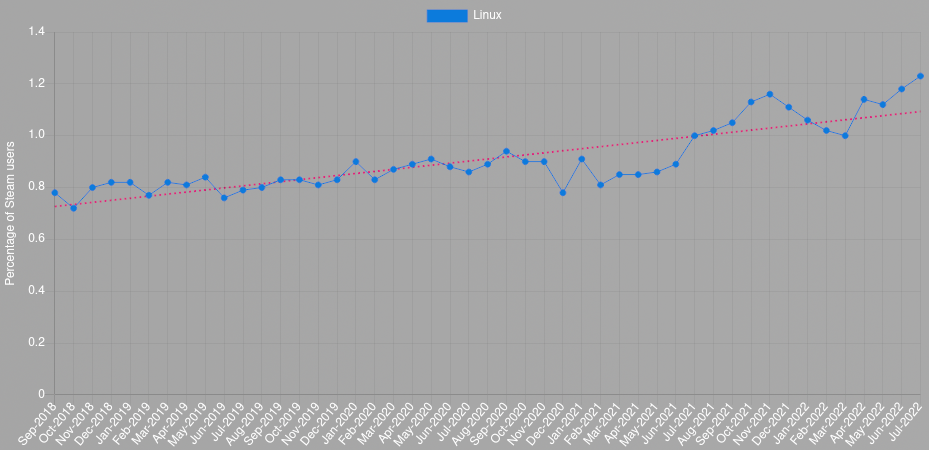Valve has put out their usual monthly Steam Hardware & Software Survey and it's looking like good news for Linux and Steam Deck once again.
We've seen the user share rise up to 1.23%, making it the highest point in multiple years (again). If we use Valve's last monthly active user count, that points the monthly active Linux user count somewhere around 1,623,600. See more on our Steam Tracker. Linux has remained at 1% or above for at least a full year now too.
According to the survey when filtering just to Linux, here are the most popular distributions:
- Arch Linux 64 bit 13.87% +2.45%
- Manjaro Linux 64 bit 11.40% +1.29%
- Ubuntu 22.04 LTS 64 bit 9.78% -0.12%
- Ubuntu 20.04.4 LTS 64 bit 9.28% -0.45%
- SteamOS Holo 64 bit 7.60% +0.02%
- Linux Mint 20.3 64 bit 6.29% -0.16%
- Freedesktop.org 21.08.14 (Flatpak runtime) 64 bit 5.29% -0.76%
- Pop!_OS 22.04 LTS 64 bit 4.90% +0.11%
- Other 31.60% -2.36%
So we're seeing Valve's SteamOS now make up 7.6% of the Linux gaming audience on Steam, which is a pretty good early showing for the Steam Deck. In terms of hardware, on the Linux side the Steam Deck appears to be the most popular device as it's now top of the list of GPUs used too.
In my case, I still use both for gaming on steam. So, in a situation like this, statistically depending on how it was counted it would appear that either:
a) There's now two distros counted for the user (Both percentages could go up)
b) That steam lost a distro user and gained a steam deck user (or vice versa, only one percentage goes up, while causing the other to drop)
In any case, it would need to be clarified as it may artificially make it appear that either you have more Linux users on steam than in actuality or that some distros are losing ground, when in fact they're just not being counted because the user has two distros being used on steam and only one of those is counted.
Well, doesn't matter... I'm doing my part! :D
Quoting: BlackBloodRumIn any case, it would need to be clarified as it may artificially make it appear that either you have more Linux users on steam than in actuality or that some distros are losing ground, when in fact they're just not being counted because the user has two distros being used on steam and only one of those is counted.It's a hardware survey, not a user survey. It's no more artificial than someone with a Windows desktop and a Steam Deck having both machines counted, or a desktop and a laptop.
The hardware survey lets developers compare the requirements of their game to the amount of hardware being used that meets those requirements. Developers making sure that their game works on Linux would be making sure their game works on both of your machines.
Other 31.60% -2.36%I am here!
Quoting: CatKillerWhile true, I think you missed my point.Quoting: BlackBloodRumIn any case, it would need to be clarified as it may artificially make it appear that either you have more Linux users on steam than in actuality or that some distros are losing ground, when in fact they're just not being counted because the user has two distros being used on steam and only one of those is counted.It's a hardware survey, not a user survey. It's no more artificial than someone with a Windows desktop and a Steam Deck having both machines counted, or a desktop and a laptop.
The hardware survey lets developers compare the requirements of their game to the amount of hardware being used that meets those requirements. Developers making sure that their game works on Linux would be making sure their game works on both of your machines.
The gen pop (not devs) are using the survey to try to guestimate how many Linux users are on steam, and often they break that statistic down to each distro also.
Devs aside, my point is about how gen pop are understanding and using said data.
So we're seeing Valve's SteamOS now make up 7.6% of the Linux gaming audience on Steam, which is a pretty good early showing for the Steam DeckThis is actually mental. This is huge!
Completely new distro, completely new platform, this OS represents only one type of device!
Future looks exciting!
Quoting: LightkeyNice, so we are already there ☺️Quoting: ZeloxWill be interesting to see if we can fight with Mac by the end of next year ☺️Funny you should mention that, I had just calculated the macOS user share for English users for comparison and it's 3.35% versus the 2.97% for Linux.
for real tho this is nice to see
Quoting: LightkeyWhich makes me wonder . . . I knew the Chinese essentially didn't use Linux, like, at all. For desktops/gaming, anyway. But what about all the other non-English speakers? For the overall percentage to be less than half the English-speaking percentage, no-Linux has to be very common out there. Why is Linux so terrible at penetrating beyond the English speaking (gaming) world?Quoting: ZeloxWill be interesting to see if we can fight with Mac by the end of next year ☺️Funny you should mention that, I had just calculated the macOS user share for English users for comparison and it's 3.35% versus the 2.97% for Linux.
Last edited by Purple Library Guy on 2 Aug 2022 at 4:16 pm UTC
Quoting: WorMzySurprising to see such a big increase for Arch (and Manjaro) percentages while SteamOS remains almost static. I wonder if Valve have changed how SteamOS identifies itself, or if more people are making the jump to Arch-based distros for some reason.I too was wondering why such a tiny increase in SteamOS. Especially since I remember last time there was an article like this, I swear SteamOS was at about 5%, meaning the current amount is a 50% increase since then, so did both the articles and the increase skip a month? Weird. It's not like they had a one month hiatus on delivering Steam Decks.
But, that's sampling for you I guess. In the old days when polls used fairly genuinely randomized samples, they used to say they were accurate within X%, 19 times out of 20. But there's always that 20th time when stuff gets out of whack cuz your random sample is randomly off.
Quoting: M@GOidIf SteamOS is 7.6% of ~1,623,600 million Linux users, it is safe to say Valve delivered about 123,000 units so far?I don't think so?
SteamOS has existed since 2013, and even though it didn't really get competitive in terms of gaming before 4.0 with the inclusion of Proton, it's still available to install on any machine that meets the hardware requirements.
So a large portion is probably Steam Decks, but I wouldn't expect all of it to be.
Quoting: BlackBloodRumWhile it's nice to see the linux user count go up, I can't help but wonder if many of those decks are people like me who have both the deck and a desktop linux computer.I got the survey on my deck, laptop, and desktop for the latest survey.
In my case, I still use both for gaming on steam. So, in a situation like this, statistically depending on how it was counted it would appear that either:
a) There's now two distros counted for the user (Both percentages could go up)
b) That steam lost a distro user and gained a steam deck user (or vice versa, only one percentage goes up, while causing the other to drop)
In any case, it would need to be clarified as it may artificially make it appear that either you have more Linux users on steam than in actuality or that some distros are losing ground, when in fact they're just not being counted because the user has two distros being used on steam and only one of those is counted.
Quoting: Purple Library GuySome people here said they are using Linux not in their native language, but in English. So 3.35% versus the 2.97% might be off. (I'm using Linux in German, though.)Quoting: LightkeyWhich makes me wonder . . . I knew the Chinese essentially didn't use Linux, like, at all. For desktops/gaming, anyway. But what about all the other non-English speakers? For the overall percentage to be less than half the English-speaking percentage, no-Linux has to be very common out there. Why is Linux so terrible at penetrating beyond the English speaking (gaming) world?Quoting: ZeloxWill be interesting to see if we can fight with Mac by the end of next year ☺️Funny you should mention that, I had just calculated the macOS user share for English users for comparison and it's 3.35% versus the 2.97% for Linux.
Last edited by Eike on 3 Aug 2022 at 5:19 pm UTC
It's amazing that the trend is continuing.
I'm curious how long would it take for us to reach 5% market share on Steam If the growth was to continue at the current pace.
I even got the Steam hardware survey yesterday, so I will be included in the next round of statistics. I'm using Nobara, so I'll be in the 'Other' Linux distro category.
Quoting: M@GOidIf SteamOS is 7.6% of ~1,623,600 million Linux users, it is safe to say Valve delivered about 123,000 units so far?I think you can say, at least 123K units. If you've participated in the Steam survey on a different computer already, it's unlikely the steam client would have offered you a chance to take the suvey on your steam deck. I just got my Steam Deck a week ago and I never got the survey. So I would say, that 123k is a mix of gamers who haven't take the survey in over a year, the few who forced the survey, and those who've never taken the survey, i.e. console only gamers.
sed -i -e '/"SurveyDate"/ s/"[0-9].*"/"'$(date +%Y-%m-%d -d "1 year ago")'"/' .steam/debian-installation/config/config.vdfJust in case anybody needs it.
Quoting: Purple Library GuyWhich makes me wonder . . . I knew the Chinese essentially didn't use Linux, like, at all. For desktops/gaming, anyway. But what about all the other non-English speakers? For the overall percentage to be less than half the English-speaking percentage, no-Linux has to be very common out there. Why is Linux so terrible at penetrating beyond the English speaking (gaming) world?A few likely reasons off the top of my head:
- Linux spreads mainly through word of mouth, which is less likely to happen across languages;
- Development happens mainly in English, which means software then has to be localized into everything else and those localizations have to try and keep up with updates but will often fall behind and only offer partial language support – for people who prefer to use software in their language (whether or not they understand English), that’s a turn-off;
- Compounding the above two points, finding support when you need it (whether online or in computer repair shops) is proportionally harder the fewer people use Linux in your language, making adoption that much more difficult until your community reaches a critical size;
- Beyond mere translation, fully localizing a product means support for atypical writing systems (right-to-left, unusual fonts, completely different keyboards/input devices that don’t exist in the Western world...), which Western developers have little incentive, and rarely the means (e.g. devices to test on and knowledge about the issues involved), to do – meaning that Linux UX is likely to be very lacking in languages where there isn’t already significant adoption by people who can contribute to its development, making it an objectively inferior OS with regards to usability;
- Geographically, there are still many places (including English-speaking ones) where computer and Windows are synonymous, just like [Facebook and Internet](https://www.theguardian.com/technology/2022/jan/20/facebook-second-life-the-unstoppable-rise-of-the-tech-company-in-africa) are. This may not be simply a matter of average computer literacy in the population, but a result of Microsoft’s efforts to position itself as the default not only in retail computers, but in schools where they can train young users to use their products exclusively. In those places, even if you hear about Linux, the mere idea of replacing the main software component your computer runs on is probably absurd, let alone having the know-how and desire to do so.
So it’s a bit of a chicken and egg problem: since consumer-oriented Linux runs largely on community effort and is not backed by a company trying to break into new markets for profit, it needs passionate developers in those communities to become a reasonably good environment in those languages. But since it’s not already appealing to those people, why would they be passionate about it and dedicate so much effort to improving it for no personal gain?
Of course I’m generalizing with many of those points – e.g. there are people who see the other qualities of Linux, put up with its limitations and try to grow it in their language for altruistic reasons – but they are all factors that would significantly slow our growth, and every single linguistic/geographic group has to be grown individually and solve unique problems that aren’t easily addressed globally from the outside.














 How to setup OpenMW for modern Morrowind on Linux / SteamOS and Steam Deck
How to setup OpenMW for modern Morrowind on Linux / SteamOS and Steam Deck How to install Hollow Knight: Silksong mods on Linux, SteamOS and Steam Deck
How to install Hollow Knight: Silksong mods on Linux, SteamOS and Steam Deck